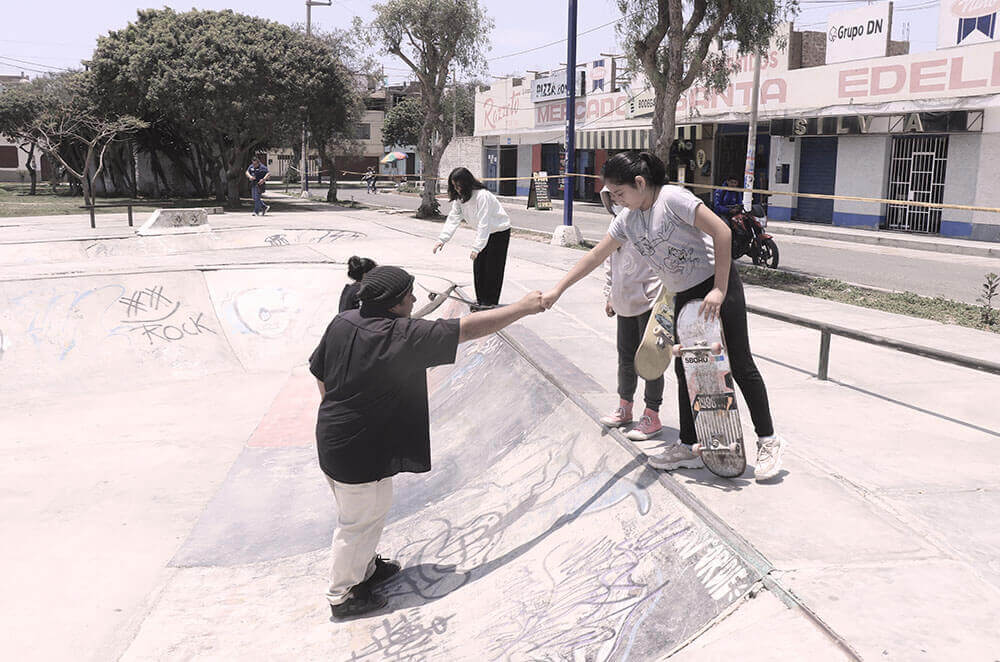Respect: we give it, we teach it
Words by Tim van Asdonck and Sita Narayan-Dinanauth
Photography by Jesús Rengifo Saldaña & Tim van Asdonck
“It’s hard to pick a favourite lesson, they all have their own charm and character.”
Tim van Asdonck is referring to life-lessons from the CJF Edu-Skate curriculum. Rather than sprinkle skate sessions and tricks with the occasional comment from teachers on what skateboarding can teach us about life, CJF decided to choose what they thought were the most impactful life-lessons related to skateboarding and create lessons around them. Working with youth on location in Peru, Jamaica and Morocco at the skateparks they built made it easy to see what life-lessons might help.
The lessons which made the cut were: attitude, awareness, confidence, cooperative learning, resilience, perseverance, support, courage, creativity, teamwork and the topic today, respect. Almost 6 years later, the Edu-Skate life-lesson structure is active in Peru, Jamaica and Morocco and is being used by CJF partners in Austria, Greece, France, the Netherlands and the United Kingdom.
“We see respect as acknowledging each other’s accomplishments and achievements in the skatepark. I really like this lesson because it helps the kids engage with each other when maybe they don’t know each other well. It’s a strong way to establish a positive atmosphere in a group.”
While Tim is aware that some experience hostility at skateparks because of competition for space, there’s a contradiction because skateboarding is loved by many for its sense of community among skaters.
“I think one of the best things about the skateboarding community is that you can do something which is an achievement for you but may seem easy for someone else and they’ll cheer your progress. I love that so much about skateboarding! That you can go to a skatepark and someone who you don’t know will acknowledge your skill.”
That’s why the lesson, working with youth aged 6–16, is built around connecting with others and their skateboarding in the park.
“With some groups of kids, we make it very practical, maybe just focus on a fist bump and use that as a basic way to show respect.”
 A fist-bump in Peru
A fist-bump in Peru
“We start the lesson with an explanation of what respect is and how it’s important to acknowledge each other and be in a good atmosphere. We discuss with the kids how skateboarders show each other respect: from tapping your board on the ground to giving them a fist bump or a secret handshake.”
Some of the children, who may be new to skateboarding and the skatepark, may not be used to this and can be quite shy about interacting in this way.
“It’s one a lot of the kids struggle with, some of them can find it difficult to give someone else a compliment or tell them they’re doing a good job but when you see it’s common within a group, it becomes easier. It’s rewarding to see them show respect because they get it from others and from then on we incorporate it into the way classes are run.”
Rather than work in isolation, the lessons are designed to build on each other and the life-lesson taught before can help with the current one.
“The lesson before is about self-confidence and you normally see the kids talking a bit more and so this is a good follow-up lesson about how to talk more and interact more with each other. You can see the skills and behaviours we worked on in the last lessons start to build.”
Do you have to adapt the respect lesson for different cultures?
“Yes, with every location, we adapt to what is appropriate. One activity might not work in one location versus another, that’s why we have a database of activities. Sometimes you just have a different group of kids. The lesson of respect remains the same even though the execution may be different.”
Learn more about CJF, hear our stories from around the world, stay up-to-date and donate if you can:
We are currently running our #MoreThanSkateparks campaign to keep our youth programmes running next year. If you have the means, please make a gift today!

 A fist-bump in Peru
A fist-bump in Peru
